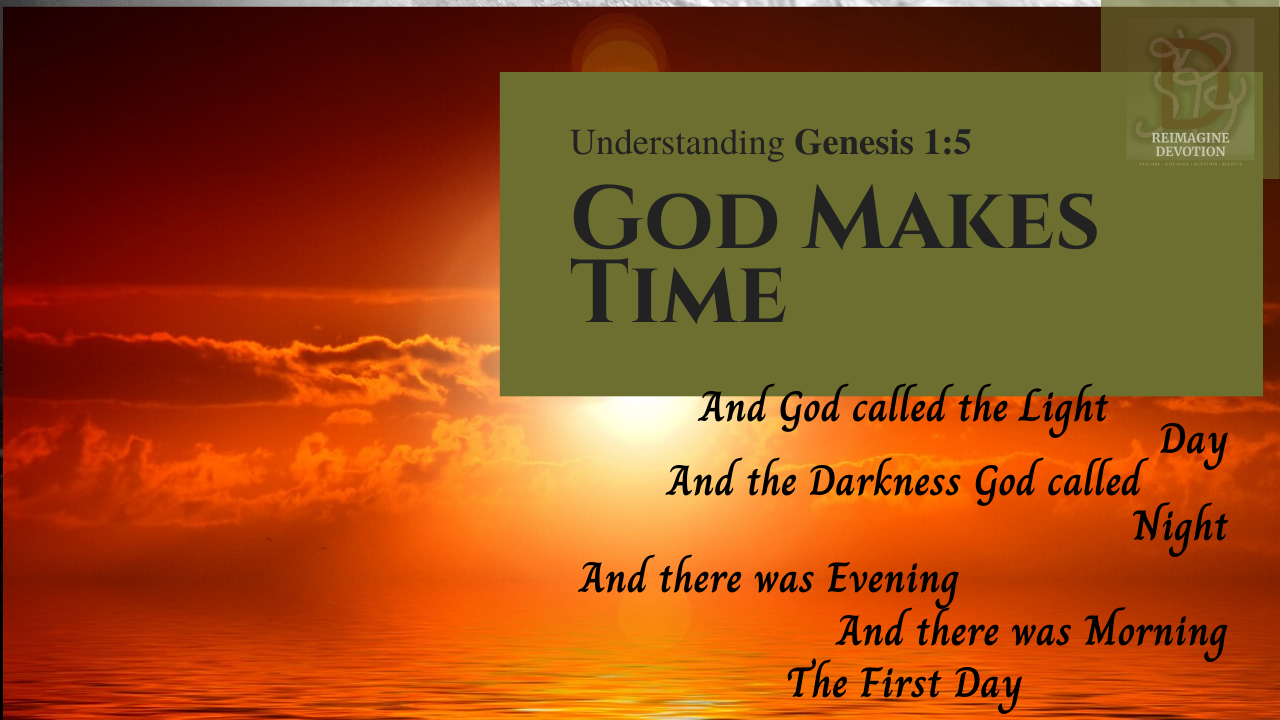Our calendar, our entire perception of time, is based on this one cycle:
Sunrise <-> Sunset.
In Genesis chapter 1 verse 5, the passage of time itself finds its origin with God.
Though each unique version of the calendar is a creation of human civilizations, the concept of the calendar is part of God’s design, to help us organize and focus our lives.
Rhythm & Evolution
 Science today tells us that our bodies and our minds require periods of light and darkness to function properly. Sleep is important to our health in every part of our live, and the circadian rhythm that allows us to sleep, and also causes us to wake, is based on the transition between light and dark.
Science today tells us that our bodies and our minds require periods of light and darkness to function properly. Sleep is important to our health in every part of our live, and the circadian rhythm that allows us to sleep, and also causes us to wake, is based on the transition between light and dark.
The cycle described here in Genesis 1, “and there was evening, and there was morning…” is literally wired into our brains, a rhythm that organizes and controls our lives.
We can speak of these traits evolving over time, of our bodies adapting to the fact that the sun does rise and set. All of that is probably true. We are creatures of this world, evolved to live in symbiosis with the environment around us.
And who knows. Perhaps if humans one day manage to move out into the deep of space, our brains will change, the circadian rhythm will fade, and the division between light and dark will no longer apply.
But as so often happens when science tries to push God out of the equation, we Christians come back and say, “Yes, ah-ha, that makes sense.” Here in Genesis, God created the day cycle before God created us. What science now proves has a biblical parallel: our circadian rhythm is based on something older than ourselves. No part of our existence is really self-contained. 
Cycles
God created us to move in cycles, so that we could experience all the joys of creation, both the activity of the day and the peace of night.
Night and day is only one such example. Most of our existence occurs in cycles—age, fertility, the change of seasons, the planting and the harvest, work and play. Like night and day, each of these brings its own joys, and its own burdens. God designed us to enjoy them all.
These cycles allow us to move forward, to learn, to grow, to understand ourselves, and to understand God. So is it any wonder that the ancient writer used one of our most important cycles – night and day – as the framework for his creation story?
The phrase “and there was evening and there was morning” is repeated six times in Genesis 1. It is used to separate one act of creation from the next, separating the story into sections like the refrain of a song separates one verse from the next. It serves as a poetic artifice, a structure that the writer can build his message around.
And the point?
God is the author of order, knowledge, and growth. Creation does not happen all at once. Rather, life grows, develops, changes, gets progressively stronger, more complex, wiser…
The cycles move God’s story forward, and move us closer to God as a result.
When does the day start?
We think of a day beginning at sunrise and ending after sunset.
But Genesis 1:5, and later verses, tells us that the day begins with evening, and then comes morning.
This is why the Jewish tradition begins the Sabbath celebration on Friday night, not on Saturday morning, because in Jewish tradition, the day begins with sunset, not sunrise. It’s a cultural difference. Do you begin the day with sleep, or with work? One culture chooses the former, another the latter. It really doesn’t matter.
In the story, however, this order, evening then morning, reinforces the themes we have already encountered in Genesis 1.
As the universe begins in darkness, so each new day begins in darkness, rescued from the Void by that great symbol for God’s love and power: the sunrise. It symbolizes not only the first creation, but the second creation, the Apocalypse when God will end evil and oblivion forever. It is the ending of the cosmic story, foreshadowed every day of our lives.
God’s story, the bible’s story, the story of each individual life, and finally the grand story of the entire universe begins in darkness, and ends in the light.

What cycles are most important in your life? Do you pray at a certain time of day, attend worship or bible study at a certain time during the week? How do you organize your time, and what part does God have in your time management? Share any thoughts below.
Missed the last few verses? Catch up with Understanding Genesis 1:4.
or

This is a brilliantly written piece. It has explained the concept of time mentioned in the Book of Genesis so well. It gives you a very different perspective and makes you question the man-made concept of time and all man-made concepts as a matter of fact. God’s word is our lamp that illuminates every path in life and reading about it in articles that are written like this feels so good. I am so glad I found this article. I have enjoyed reading it thoroughly. My compliments to the author!
Thanks Samantha! The human tendency to anthropomorphize (ascribe human features) is probably as old as our race. In fact, it appears right here in Genesis 1 when the writer tells us that God “spoke” the universe into being. As brilliant as that is as a metaphor, when you stop to think about it, does God actually have a “voice” – a throat that manipulates air into sound? No, these are human features. Our understanding of God always will have limits.
Interesting that I find this article right at the cycle of time of Shavuot this weekend. I understand His time somewhat, and wonder if some of the cycles of time are lost when we don’t understand this one concept of the day beginning at sunset. I kinda wonder if He has the day begin at sunset so we, most of us, are beginning our “rest”. Taking our hands off, so to speak. And then we sleep for the initial beginning of the day.
So, back to the time of Shavuot, where we have been counting 40 days – again, counting from evening to evening. I have found that as i spend more time studying His time, and His cycles – seedtime and harvest as you have said – also the cycles of the Holidays. Would be interested in your take on these commanded, God-made, times of rest. Thanks for your insight for sure, this is good reading!
Thanks for sharing your great thoughts here, Leona! I think you’re exactly right about starting the day at sunset, in the time of rest. In Genesis 3:8, a phrase that’s usually translated something like “the cool of the day,” and is understood to refer to evening or sunset, is literally in the Hebrew “spirit of the day.” It suggests that the ancients did view the ending of the day to be a spiritual time of rest, like the Sabbath itself, when God moves on earth.
When I look in scripture, particularly the Hebrew bible, I see great emphasis placed on the “God-made times of rest” that you mention. There are times where prophets accuse the people of ignoring these times of rest, and declare that God will send the people into exile so that the land itself can have it’s rest (for example, Lev. 26:43). These verses have been on my mind a lot recently with the forced rest that COVID-19 has imposed on a lot of us, and the evidence we’re see of this forced rest reducing pollution across the planet.
I also think that rest is an opportunity for us to remember our reliance on God and how important it is for us to understand that nothing we can achieve in life is eternal. Hard work is important, and with it we honor God. But there is more to life, and we also honor God by resting.
Hi Shanna
This is a beautifully written, thoughtful and thought-provoking article. As I read through it, I found myself nodding, having several “aha” moments and wondering to myself how it was that I’d never really stopped and considered that point before? Or that one? Just recently my mother and I were discussing the Sabbath and when to observe it. She said Saturday and I said Sunday. It will be interesting to share with her your reference to Jewish culture and the Sabbath beginning on a Friday night!
Thanks Shell! I actually started writing this Genesis post series because of a similar experience to what you describe here. After four years in seminary, having everything I thought I knew about God and the bible turned upside-down about five times a week, after graduation, I sat down and did something I hadn’t done since I was a kid: I just read the creation story in Genesis. Just read it. I had read those three chapters literally dozens of times before, but suddenly, so many things just jumped out at me. I suddenly started making all of these connections and couldn’t believe I hadn’t noticed them before. It’s not an exaggeration to say that it changed my life, and is a big part of why I’m writing this now.
Thanks for writing this piece. It is interesting to note that the world started from darkness and there was light from nothingness to something. It mirrors our lives we start with nothing, from darkness in the womb and then come to the light when we are born. We then acquire something e.g knowledge, skills which we are supposed to use in the light. I’m typing this and its 9 pm Sunday according to how we count time, so if as you say the day starts in the evening, does it mean that it is already Monday?
I also liked the video as well different but effective. Good understanding of the verse. What made you think of taking verse by verse instead of the whole chapter?
Great insight here, Sasa. Darkness than light does mirror how we all come into the world, just as it mirrors how the universe itself began. Yes, I suppose if we started days in the evening, it would already be Monday. And actually, with the 24 hour clock, the day starts at midnight, so we do still start the day in darkness, just not at sunset.
Great question: I started going verse by verse for a few reasons, but mainly because I noticed too many interesting things and felt it would be overwhelming to try to write about all of them at once. Not only did I think it would be overwhelming to the reader, but I thought it would have been overwhelming to me to try to organize everything and not forget or leave things out. Going verse by verse gives me a built in framework to make sure I get to all the things I want to get to. Eventually, I hope to go back and write chapter 1, 2, 3… summary posts, and maybe talk more in detail about some of the themes.